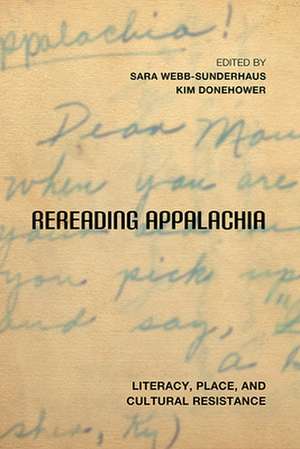Rereading Appalachia: Place Matters: New Directions in Appalachian Studies
Editat de Sara Webb-Sunderhaus, Kim Donehower Contribuţii de Ryan Angusen Limba Engleză Paperback – 29 dec 2017
Appalachia faces overwhelming challenges that plague many rural areas across the country, including poorly funded schools, stagnant economic development, corrupt political systems, poverty, and drug abuse. Its citizens, in turn, have often been the target of unkind characterizations depicting them as illiterate or backward. Despite entrenched social and economic disadvantages, the region is also known for its strong sense of culture, language, and community.
In this innovative volume, a
| Toate formatele și edițiile | Preț | Express |
|---|---|---|
| Paperback (1) | 211.30 lei 6-8 săpt. | |
| The University Press of Kentucky – 29 dec 2017 | 211.30 lei 6-8 săpt. | |
| Hardback (1) | 315.26 lei 6-8 săpt. | |
| University Press of Kentucky – 8 noi 2015 | 315.26 lei 6-8 săpt. |
Preț: 211.30 lei
Nou
40.43€ • 42.32$ • 33.65£
Carte tipărită la comandă
Livrare economică 31 martie-14 aprilie
Specificații
ISBN-10: 0813174422
Pagini: 238
Dimensiuni: 152 x 229 mm
Greutate: 0.35 kg
Editura: The University Press of Kentucky
Seria Place Matters: New Directions in Appalachian Studies
Notă biografică
Sara Webb-Sunderhaus, associate professor of English at Indiana University--Purdue University Fort Wayne, is a contributor to Reclaiming the Rural: Essays on Literacy, Rhetoric, and Pedagogy and The Norton Book of Composition Studies.
Kim Donehower is associate professor of English at the University of North Dakota and the coauthor of Rural Literacies.







